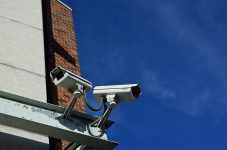The Effect of CCTV on Crime

The installation of CCTV cameras is often seen as a sure-fire way of reducing criminal activity at a particular location.
However, a growing body of research suggests CCTV may not be as effective as previously thought at deterring and solving crime.
Theory
Proponents of a surveillance state argue that CCTV acts as a deterrent to would-be criminals; making it less likely they will engage in crime while under the prying eyes of cameras.
The believe the widespread use of cameras in public places results in the reduction of crime.
Research
But while billions of dollars are spent worldwide on CCTV systems, there is little evidence that they act as a significant deterrent to crime.
Dr Robert Carr reviewed several major worldwide studies (a process called ‘meta-analysis’), concluding that CCTV cameras “reduced crime in very few examples.”
Meta-analysis by Welsh and Farrington similarly found that CCTV only has a “modest effect on crime”.
A follow-up UK study found that notable reductions in crime only occurred in two places: parking lots and public-transit systems.
The drop in other surveilled public areas, and in several other countries, was insignificant.
The largest Australian study, which looked at Surfers Paradise and Broadbeach in Queensland, found that CCTV cameras did not reduce any category of offending. As a result, the authors of the study concluded,
“The effectiveness of CCTV as a crime prevention tool is questionable.”
Offender Perspective
A survey of offenders sought to ascertain whether the presence of CCTV did or would deter them from offending.
The survey found the existence of cameras made little difference to offending behaviour. 16% of participants said they had offended despite knowing cameras were present, 31% said they “did not know” and “did not check” whether cameras were present, and 53% “did not know” whether cameras were present and “did not much care”.
Specific Offending
It has, however, been found that CCTV can in limited instances deter crime in the short term; with the deterrent effect declining over time.
The Australian Institute of Criminology believes this is consistent with anti-crime technology generally:
“Innovative work creates uncertainty for a while for the offender, often fed by lashings of publicity that crime is going to be more difficult or risky for the offender. As uncertainty fades, new crime skills are developed and confidence that crimes can be committed successfully returns.”
The Institute notes that a great deal of public offences – including street fights and minor property crimes – are committed spontaneously, or after negligible planning, with offenders failing to take the time to ascertain the presence of CCTV.
Identifying Offenders
Detective Chief Inspector Mike Neville, who leads Scotland Yard’s Visual Images, Identifications and Detections Office, argues that CCTV has done little to reduce crime or identify offenders, despite the enormous resources put into implementing and managing the country’s vast network.
He says that only 3% of London’s street robberies had been solved using CCTV footage, describing the system as an “utter fiasco”.
Deputy Chief Constable Graeme Gerrard from the Chief Police Officers Association agrees, telling the BBC,
“CCTV is not as effective as generally believed… If you recover fingerprints or DNA, you can match it against national databases”, he said.
“There is no national database of images of people. So whilst we might have the images, the difficulty we then have is trying to identify who it is and sometimes that isn’t easy and clearly we can do better.”
So while some believe a surveillance state is a tried and true way of reducing crime, the research tells a different story.






